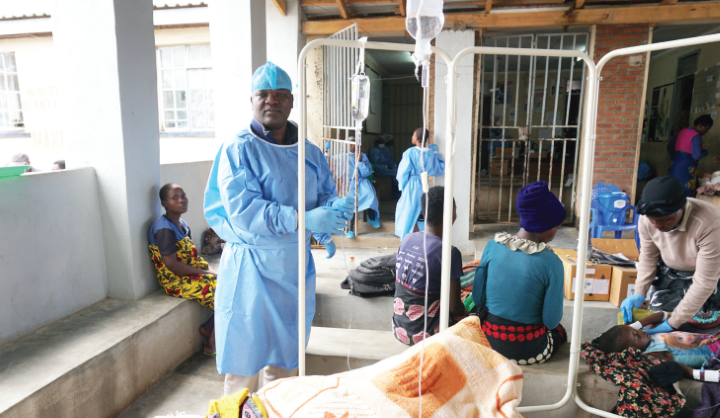Govt whips up health financing
For years, caregivers in Malawi’s public healthcare facilities have been sending back patients empty-handed amid persistent lack of essential medicines.
To avert preventable deaths, health workers sometimes ask guardians to fuel ambulances to evacuate critical patients and pregnant women with deadly complications to hospitals with more staff and resources.

The dearth compels the poor to buy prescribed drugs from pricy private drugstores.
This follows decades of low spending on the country’s overwhelmed healthcare system struggling with a high disease burden.
This dials up calls for increased financing for the healthcare system.
Malawi nodded to the Abuja Declaration of 2001 when African leaders pledged to spend at least 15 percent of national budgets on healthcare.
However, the country’s healthcare financing falls below the agreed minimum, only to hit a record high this year.
For the first time in 10 years, healthcare spending has received a lion’s share worth K729.47 billion, representing 12.2 percent of the proposed K5.9 trillion budget.
This means that Minister of Finance and Economic Affairs Simplex Chithyola Banda’s first budget, presented last week, falls short of the 15 percent target by 2.8 percent.
However, activists say the narrow gap renews hope for increased healthcare financing, unlike in the previous budgets.
For five years, the gap ranged between five and 5.4 percent.
However, the difference hit 6.5 percent in the 2023/24 fiscal year ending in March when the lifesaving sector was allocated K330 billion, about 8.5 percent of the budget.
During pre-budget consultations, Health and Rights Education Programme (Hrep) recommended greater spending on the health sector to achieve the continental target.
Its submissions for the budget under Parliament’s scrutiny read: “The government, in 2024/25 National Budget, must adhere to commitments made at the African Union leaders meeting declaration to allocate 15 percent of the national budget to health, which is five percent of the GDP [gross domestic product].”
Hrep executive director Maziko Matemba also asked the government to implement health reforms listed in the Malawi Health Financing Strategy of 2023 to 2030.
He says even though the current allocation falls shy of the desired 15 percent threshold, the hike offers hope for increased healthcare financing.
“Of course, we wanted 15 percent. However, this still shows that Malawi is going in the right direction towards meeting national and global commitments,” said Matemba.
Matemba says apart from health financing reforms, the government need to complete the construction of 900 health posts and the National Cancer Centre at Kamuzu Central Hospital in Lilongwe.
The activist calls for improved health facility grants and financing of patients’ referral services. Currently, many patients spend months on a lengthening waiting list to access specialised treatment for cases that cannot be managed locally.
Physicians Assistants Union of Malawi president Solomon Chomba termed the 12.2 percent allocation unprecedented.
“This is historical and demonstrates this government’s commitment to achieve quality universal health coverage as envisioned in our Malawi 2063.
“Our word of caution to the Ministry of Health is that it should prioritise these resources towards strengthening health systems, which is crucial to combating all health-related epidemics and shocks, including the welfare, recruitment and promotions of health workers.”
Similarly, the Malawi Health Equity Network executive director George Jobe says the “landmark allocation” gives confidence that Malawi will soon meet the 15 percent Abuja Declaration target.
“The 12.2 percent is closer to the Abuja Declaration target which gives us the confidence and hope that we are moving towards this target,” he said.
Presenting the 2024/25 National Budget in Parliament last Friday, the minister spelled out several healthcare-related projects on the government’s priority list.
They include the completion of the cancer centre, the construction of district hospitals in Dowa and Rumphi and a feasibility study for a new district hospital in Chikwawa.
Other highlights include an emergency project to protect essential health services from disruption in times of disasters, the Malawi Covid-19 Emergency Response and Health Systems Strengthening Project.
However, increased spending is crucial for everyone to get quality services within five kilometres from where they live, as promised by President Lazarus Chakwera administration. His Malawi Congress Party (MCP) also promised a healing for the health sector “in a state of flux” and “perpetually affected by shortages of essential equipment”.
“This will, however, require reconfiguring the country’s health system since it is currently in a state of flux,” reads the MCP manifesto. “It is only a well-functioning health system which can provide an entire population with access to appropriate, acceptable and effective medical care.





I do trust all the ideas youve presented in your post They are really convincing and will definitely work Nonetheless the posts are too short for newbies May just you please lengthen them a bit from next time Thank you for the post
Somebody essentially lend a hand to make significantly articles Id state That is the very first time I frequented your website page and up to now I surprised with the research you made to make this actual submit amazing Wonderful task